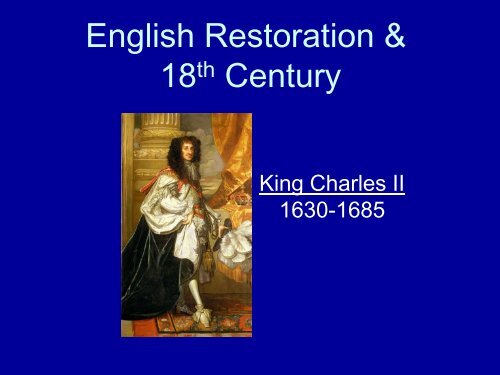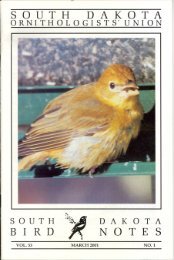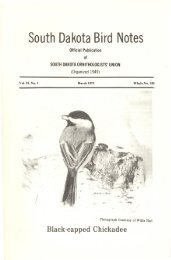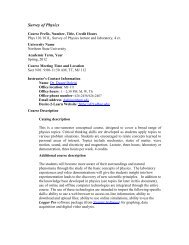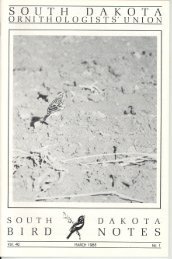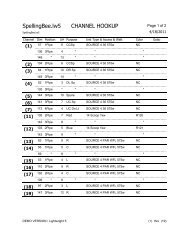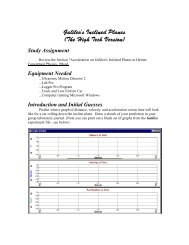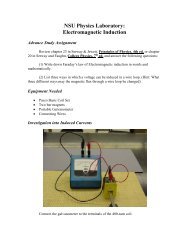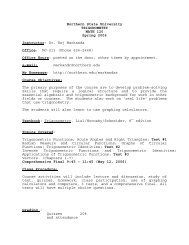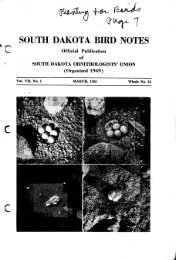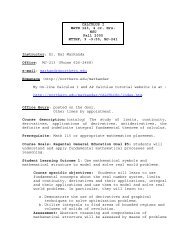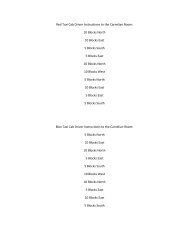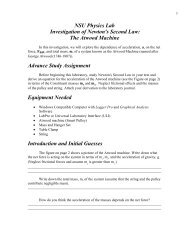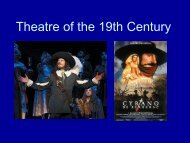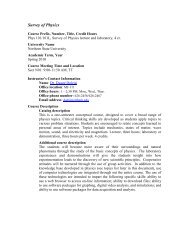Theatre from Restoration to Romanticism: England, 1660-1800
Theatre from Restoration to Romanticism: England, 1660-1800
Theatre from Restoration to Romanticism: England, 1660-1800
- No tags were found...
Create successful ePaper yourself
Turn your PDF publications into a flip-book with our unique Google optimized e-Paper software.
English <strong>Res<strong>to</strong>ration</strong> &<br />
18 th Century<br />
King Charles II<br />
1630-1685
<strong>Res<strong>to</strong>ration</strong> Comedy<br />
• A comedy of<br />
manners<br />
• Ridiculed human<br />
failings<br />
• Breaches of a<br />
"sophisticated code<br />
of manners"<br />
• Established by the<br />
courtiers of Charles<br />
II
Ideal Gentleman<br />
1. Was well born<br />
2. Well dressed<br />
3. Poised and witty<br />
4. Skilled in love making<br />
5. Conduct several affairs simultaneously<br />
6. Never boasted of his affairs<br />
7. Always discreet<br />
8. Never fell in love<br />
9. Not jealous if his wife <strong>to</strong>ok a lover
Fashionable Young Lady<br />
1. Familiar with the world of intrigue,<br />
2. But did not become involved in it.<br />
3. If she was a widow, she could take a<br />
lover as long as she was not found<br />
out<br />
4. If she was married, she should not<br />
expect constancy in her husband.
William Congreve<br />
1670 - 1729<br />
• Wrote 4 comedies<br />
and 1 tragedy<br />
• His masterpiece:<br />
The Way of the<br />
World (1700)<br />
• Best example of<br />
<strong>Res<strong>to</strong>ration</strong><br />
Comedy
Way of the World
John Dryden<br />
1631-1700<br />
• Primarily a poet<br />
• Critic<br />
• Transla<strong>to</strong>r<br />
• Playwright noted for<br />
his Neo-Classic<br />
Tragedies<br />
• Major literary figure<br />
of <strong>Res<strong>to</strong>ration</strong><br />
<strong>England</strong>
All for Love<br />
or “A World Well Lost”<br />
1677<br />
• Dryden’s most often revived work<br />
• Based on Shakespeare’s Anthony and<br />
Cleopatra<br />
• He <strong>to</strong>ok Shakespeare's episodic tragedy,<br />
and turned it in<strong>to</strong> a small cast climactic<br />
tragedy which observes the unity of time<br />
and place.
Episodic <strong>to</strong> Climactic<br />
• 15 years of dramatic time in<strong>to</strong> one 24 hour<br />
day.<br />
• Large cast (30 men and 4 women) in<strong>to</strong> a<br />
smaller and more manageable cast (6<br />
men and 4 women).<br />
• Scenes in Rome and Egypt in<strong>to</strong> one<br />
location: in front of the Temple of Isis in<br />
Aleixandre, Egypt
The Ac<strong>to</strong>r-Manager<br />
• Acting company owned and controlled by<br />
one man: the manager<br />
• Usually was the leading ac<strong>to</strong>r<br />
• Chose plays which best exhibited his<br />
abilities<br />
• Wife was often the leading lady<br />
• Remainder of the company was hired<br />
• Managed the theatre in which they<br />
performed
David Garrick<br />
1717-1779<br />
• Ac<strong>to</strong>r with over 90<br />
roles in his reper<strong>to</strong>ry<br />
• Manager of Drury<br />
Lane<br />
• Playwright or<br />
adapter<br />
• Direc<strong>to</strong>r and<br />
designer
Women on the English Stage<br />
• Were introduced during the <strong>Res<strong>to</strong>ration</strong><br />
The Problems…<br />
1. Acting was not socially acceptable<br />
2. Few women roles in the standard<br />
reper<strong>to</strong>ry<br />
3. New works, especially <strong>Res<strong>to</strong>ration</strong><br />
Comedy used more women<br />
4. Women were often “retired” by their lover<br />
after a short life on stage
Nell Gwynn<br />
1650-1687<br />
• Most popular comic<br />
actress of the<br />
period<br />
• Performed for only<br />
4 years: 1665-1669<br />
• Was mistress of<br />
King Charles<br />
• Bore him two sons<br />
• Was “retired” by<br />
order of the King
Legitimate theatre<br />
• Only two theatres in London permitted <strong>to</strong><br />
present full length dramas<br />
• Also known as Royal and Patent <strong>Theatre</strong>s<br />
• After the Licensing Act of 1737, the two<br />
legitimate houses were Covent Garden<br />
and Drury Lane<br />
• The monopoly lasted for 183 years, <strong>from</strong><br />
<strong>1660</strong> <strong>to</strong> 1843.
Legitimate <strong>Theatre</strong><br />
Today:<br />
<strong>Theatre</strong> of the spoken word
Minor <strong>Theatre</strong>s<br />
A London playhouse which could not<br />
perform "regular" drama<br />
They could present…<br />
1. Short plays (two or three act)<br />
2. Operas<br />
3. Melodramas<br />
4. Illustrated lectures
<strong>Res<strong>to</strong>ration</strong> Stage<br />
<strong>1660</strong><br />
• A proscenium theatre with a deep<br />
forestage or apron<br />
• Proscenium framed the scenery<br />
• Ac<strong>to</strong>rs performed on the forestage<br />
• Entrances were made through doors on<br />
the apron<br />
• Audi<strong>to</strong>rium held about 700
Cross Section of Drury Lane<br />
1672<br />
1. Proscenium<br />
2. Wings<br />
3. Pit<br />
4. Gallery<br />
5. Boxes
<strong>Res<strong>to</strong>ration</strong> <strong>Theatre</strong>
A <strong>Res<strong>to</strong>ration</strong> <strong>Theatre</strong>
Richard Sheridan<br />
1751-1816<br />
• Playwright<br />
remembered for his<br />
Sentimental<br />
Comedies<br />
• Manager of Drury<br />
Lane<br />
• Member of Parliament<br />
• Most important work:<br />
The School for<br />
Scandal (1777)
The School for Scandal
John Gay<br />
1685-1732<br />
• Poet and Playwright<br />
• Wrote political satire<br />
• Most important work:<br />
The Beggar’s Opera<br />
(1728)<br />
• Was a Ballad Opera<br />
• Ran for 62 consecutive<br />
performances<br />
• First long run
The Beggar’s Opera<br />
W. Hogarth’s Painting (1728)
Ballad or Italian Opera<br />
• Ballad Opera: Music is adapted <strong>from</strong><br />
popular folk songs or bar room tunes<br />
• Italian opera: Original music is composed<br />
for the production
Beginning of American <strong>Theatre</strong><br />
1752- English ac<strong>to</strong>r Lewis<br />
Hallam (1714-1756)<br />
establishes a theatre in<br />
Williamsburg, PA<br />
They also perform in…<br />
1. New York, NY<br />
2. Philadelphia, PA<br />
3. Charles<strong>to</strong>n , SC
Drury Lane<br />
1794-1809<br />
• Capacity: 3,600<br />
• Stage: 85’ wide by 92’<br />
deep<br />
• Proscenium: 43’ wide by<br />
38’ high<br />
• <strong>Theatre</strong> was <strong>to</strong>o large<br />
for drama
18 th Century – <strong>Res<strong>to</strong>ration</strong><br />
<strong>Theatre</strong>
Drury Lane Burns<br />
1809
Royal Drottningholm <strong>Theatre</strong><br />
S<strong>to</strong>ckholm, Sweden
• Small court theatre<br />
• Built in 1766<br />
• Closed in 1792<br />
• Rediscovered in<br />
1920<br />
• Reopened in 1922<br />
• Working example of<br />
a 18 th century court<br />
theatre
Interior of the Drottningholm<br />
<strong>Theatre</strong>


